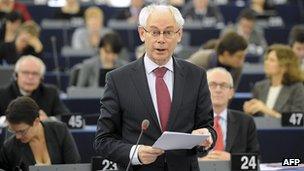Europe and crisis for democracy
- Published
- comments

The eurozone crisis has given EU Council President Herman Van Rompuy a key role
The European Union's finest hour was when it stood as a beacon for democracy, the rule of law and a civil society and enticed the peoples of Eastern Europe to embrace freedom. It remains an enduring triumph.
Now in parts of Europe democracy is being discarded like unwanted clothing. The technocrats - nurtured in the European bureaucracy - have taken control in Athens and Rome.
If the polls are to be believed the people, for the time being, are on the side of the technocrats. They have grown weary of the politicians.
I have stood outside the Greek parliament as the crowd bayed "thieves!" at the MPs inside. In Greece one of the perks of power was patronage; thousands of public sector jobs were linked to the political parties.
In Italy MPs have gorged themselves on privileges. They are the best-paid deputies in Europe. Even the barber inside the Chamber of Deputies is said to be on 130,000 euros.
Elite takes charge
In the midst of the European crisis there are few voices making the case for democracy. Indeed many officials see elections and democracy as standing in the way of resolving the crisis.
Perhaps the clearest definition of democracy was contained in the American Declaration of Independence in 1776. "Governments are instituted among men, deriving their just powers from the consent of the governed."
In Europe "the consent of the governed" is in danger of going missing. When George Papandreou suggested putting the EU bailout to a referendum in Greece, France's President Sarkozy, in a conversation with President Obama, had the Greek leader down as a madman, suffering from depression.
At the heart of the European project lies a suspicion of the people. It is often said that the European Union has been built in spite of the people, and not with the people. Those who argue the people's case are dismissed as "populists". It is the easy Brussels put-down.
Recently when a reporter challenged the perks of the EU commissioners his question was dismissed as "populist". To question immigration policy even at a time of shocking youth unemployment is to risk the tag "populist".
In answer to those who want to see a reform of the EU treaties the UK Deputy Prime Minister Nick Clegg declared that only "populists, chauvinists and demagogues" would benefit from such an exercise.
EU's inner circle
As the eurozone crisis has deepened, so the crisis management team, the firefighters, has narrowed.
The inner circle is the so-called Frankfurt Group. It is made up of the President of the Commission, the President of the European Council, the head of the IMF, the head of the European Central Bank, the Monetary Affairs Commissioner, the head of the Eurogroup and, of course, the leaders of France and Germany.
What they decide is no small matter. The technocrats answer to them. There are EU officials inside the ministries in Athens. The EU is insisting that party leaders in Greece sign a document agreeing to the details of the bailout package. In Italy IMF inspectors will every three months pore over the accounts.
As Martin Wolf writes in the Financial Times, external, "monetary and fiscal policies or labour market regulations are at the core of democratic politics".
What has been agreed at a succession of emergency summits raises huge questions about the "consent of the governed". National government control over tax and spending is being rewritten. Unelected officials in Brussels will get first sight of national budgets.
The German Chancellor, Angela Merkel, is now softening up her electorate for bigger changes yet to come. She foresees more Europe, leading to an eventual political union, external. Now some within her own party understand that will require democratic oversight and have suggested that the President of the Commission be elected by popular vote. But that can scarcely be enough.
More Europe cannot be nodded through. It is an open question, however, whether Europe's peoples will be consulted.
The European Parliament is assuming more power and some of its debates are informed and impressive. It suffers from the fundamental flaw that it does not have the responsibility of forming a government and subjecting its programme to the voters. To be effective parliaments need oppositions that hold governments to account.
David Miliband, the former British Foreign Secretary, writes that "every political system is a balance of efficiency and legitimacy. The sceptics sacrifice efficiency for legitimacy... the federalists substitute legitimacy for efficiency".
The federalists are, of course, not just driven by a desire to be efficient but by a dream of a united Europe. Mr Miliband argues that it is in Britain's interest to be at the heart of Europe and not an outsider. He believes that to seek a repatriation of powers at this time would be a delusion.
All of that may be true, but the democratic question cannot be parked forever.